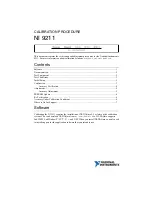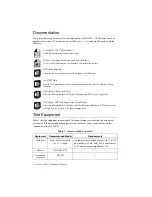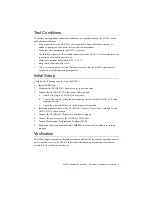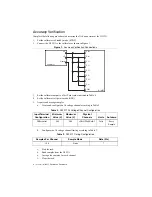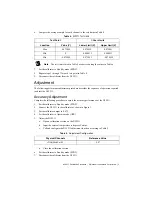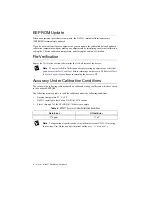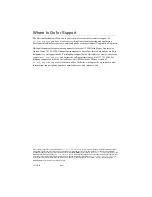
NI 9211 Calibration Procedure
|
© National Instruments Corporation
|
3
Test Conditions
The following setup and environmental conditions are required to ensure the NI 9211 meets
published specifications.
•
Keep connections to the NI 9211 as short as possible. Long cables and wires act as
antennae, picking up extra noise that can affect measurements.
•
Verify that all connections to the NI 9211 are secure.
•
Use shielded copper wire for all cable connections to the NI 9211. Use twisted-pairs wire
to eliminate noise and thermal offsets.
•
Maintain an ambient temperature of 23 °C ±5 °C.
•
Keep relative humidity below 80%.
•
Allow a warm-up time of at least 10 minutes to ensure that the NI 9211 measurement
circuitry is at a stable operating temperature.
Initial Setup
Complete the following steps to set up the NI 9211.
1.
Install NI-DAQmx.
2.
Make sure the NI cDAQ-9178 power source is not connected.
3.
Connect the NI cDAQ-9178 to the system safety ground.
a.
Attach a ring lug to a 14 AWG (1.6 mm) wire.
b.
Connect the ring lug to the ground terminal on the side of the NI cDAQ-9178 using
the ground screw.
c.
Attach the other end of the wire to the system safety ground.
4.
Install the module in slot 8 of the NI cDAQ-9178 chassis. Leave slots 1 through 7 of the
NI cDAQ-9178 chassis empty.
5.
Connect the NI cDAQ-9178 chassis to your host computer.
6.
Connect the power source to the NI cDAQ-9178 chassis.
7.
Launch Measurement & Automation Explorer (MAX).
8.
Right-click the device name and select
Self-Test
to ensure that the module is working
properly.
Verification
The following performance verification procedure describes the sequence of operation and test
points required to verify the NI 9211 and assumes that adequate traceable uncertainties are
available for the calibration references.

